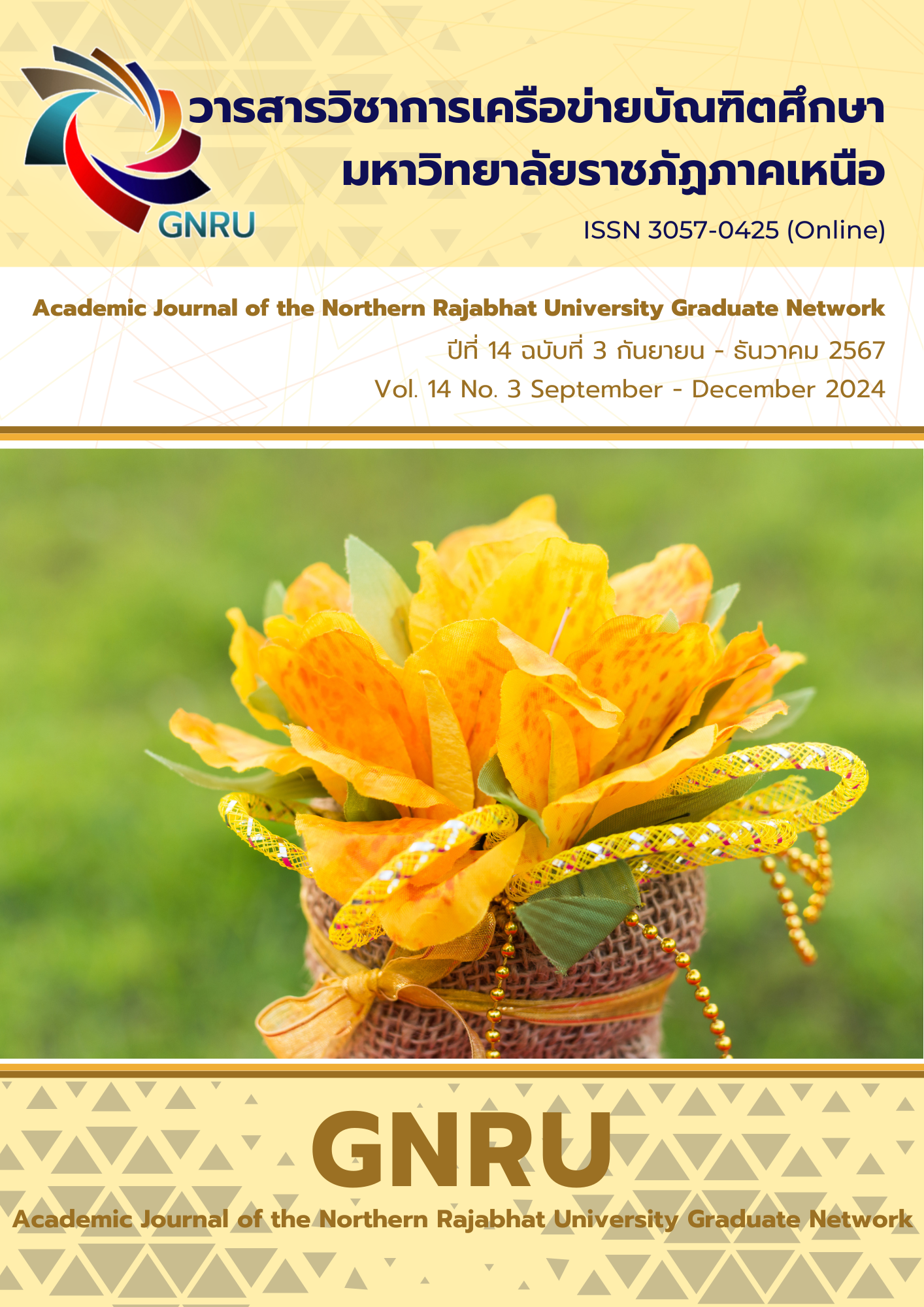5 THE EFFECTS OF REFLECTIVE THINKING ACTIVITIES ON CRITICAL THINKING ABILITIES AND ACADEMIC ACHIEVEMENT OF GRADUATE SCIENCE TEACHER STUDENTS AT CHIANGMAI RAJABHAT UNIVERSITY
Main Article Content
Abstract
The purposes of this research were to study the critical thinking abilities of graduate science student teachers who studied with reflection activities and compare learning achievement scores between before and after studying by reflection activities. Participants in the research were 11 graduate science student teachers in the science teaching curriculum studying at the first semester of 2023 Chiangmai Rajabhat University who enrolled in the course ESCI 5101 (Teachership and Psychology of Learning), selected by purposive sampling. The instruments of this research were lesson plans based on reflection activities, a learning achievement test, a reflection activity journal, and a critical thinking ability test. The statistics used for data analysis were mean, standard deviation, Wilcoxon signed rank test, and content analysis. The results revealed that the overall critical thinking abilities of the graduate science teacher students after study were at a high level, and the learning achievement after learning was significantly higher than that before learning at the .05 level.
Article Details
References
Dressel, P.L. and Mayhew, L.B. (1957). General Education : Explorations in Evaluation. (2nd ed). Washington D.C.: American Council on Education.
Gardner, H. (1983). Frames of Mind: A Theory of Multiple Intelligences. New York: Basic Books. Gibbs, G. (1988). Learning by doing: a guide to teaching and learning methods. Oxford: Further Education Unit.
Johns, C.(Ed.). (2017). Become a Reflective Practitioner. London: John Wiley & Sons.
Kaewphrom, C. (2013). Developing reflective skills of nursing students by writing learning records in Course on teaching and health counseling. Journal of Phrapokklao College of Nursing, Chanthaburi, 24(2),12-20.
Kanchanarat, K. (2024). Developing learning activities through reflection to promote self-awareness and academic achievement. of 3rd year undergraduate students, Phatthalung College of Dramatic Arts, Suan Sunandha Academic Journal of Education, 8(1), 38-52.
Khaemmanee, T. (2011). Analytical, synthetic, creative and critical thinking skills: Integration in learning management. Royal Institute Journal, 36(2), 188-204.
Khaemmanee, T. (2020). Teaching Science (24th edition). Bangkok: Chulalongkorn Publishing House, 15-16.
Leyden, D.P. (2011). Critical Thinking in Economics. North Carolina: Kona Publishing and Master of Education in Health and Physical Education. Faculty of Education, hulalongkorn. Media Group.
Ministry of Education. (2010). Workshop on developing integrated teaching and learning in schools. Small size according to the focus of OBEC. Bangkok: Office of Academic Affairs and Educational Standards.
Mueannadon, R., Tirapraiwong, Y., Srichairatanakul, J. and Yuttayong, S. (2019). Developing learning through reflection, Journal of Health and Nursing Research, 35(2), 13-25.
Natanjai, W. (2022). Results of health education learning management using reflection on achievement. Oxford Further Education Unit.
Pengsawat, W. (2009). Research and Development. Journal of Sakon Nakhon Rajabhat University, 1(2), 2-12.
Pislae-ngam, K. (2019). Results of learning management using reflective methods using Gibbs'cycle model. Phra Prajadhipok Klao Chanthaburi, 24(2), 12-20.
Phothiyen., K. (2022). How to teach students to think critically. Journal of Education, Silpakorn University, 20(2), 11-25.
Ritthikup, W. (2017). Results of teaching and learning using reflective journal writing activities according to Contemplative education in teaching arts subjects. Rajapruek Journal, 15(2), 27-34.
Sawangjit, S., Kanglee, K. and Klinchetu, N. (2019). The results of using the group process teaching model through reflection to enhance academic achievement and skills in critical thinking and problem solving. For nursing students Army Nursing College, Army Nursing Journal, 20(3), 333–342.
Sangraksa, N. and Thammaphipon, S. (2020). Reflection on learning: Perspective on building an organization. Small schools according to the OBEC focus areas, Bangkok: Office of Academic Affairs and Educational Standards.
Srisa-at, B. (2002). Basic research. (7th printing). Bangkok: Suviriyasan.
Ritthikup, W. (2017). Results of teaching and learning using reflective journal writing activities according to Contemplative education in teaching arts subjects. Rajapruek Journal, 15(2), 27-34.
Wangchob, S., Homkham, U., Bunket, N. and Sanguansat, K. (2020). Results of learning in Reflect using structured and freeform online mind maps that affect your ability to Critical thinking of undergraduate students with different learning styles. Graduate Journal Pitchayathasat College, 15(1), 181-193.
Wichainaet, K. (2014). Reflection: Teaching to enable nursing students to develop critical thinking. Judgment in nursing practice. Police Nursing Journal, 6(2), 188-199


